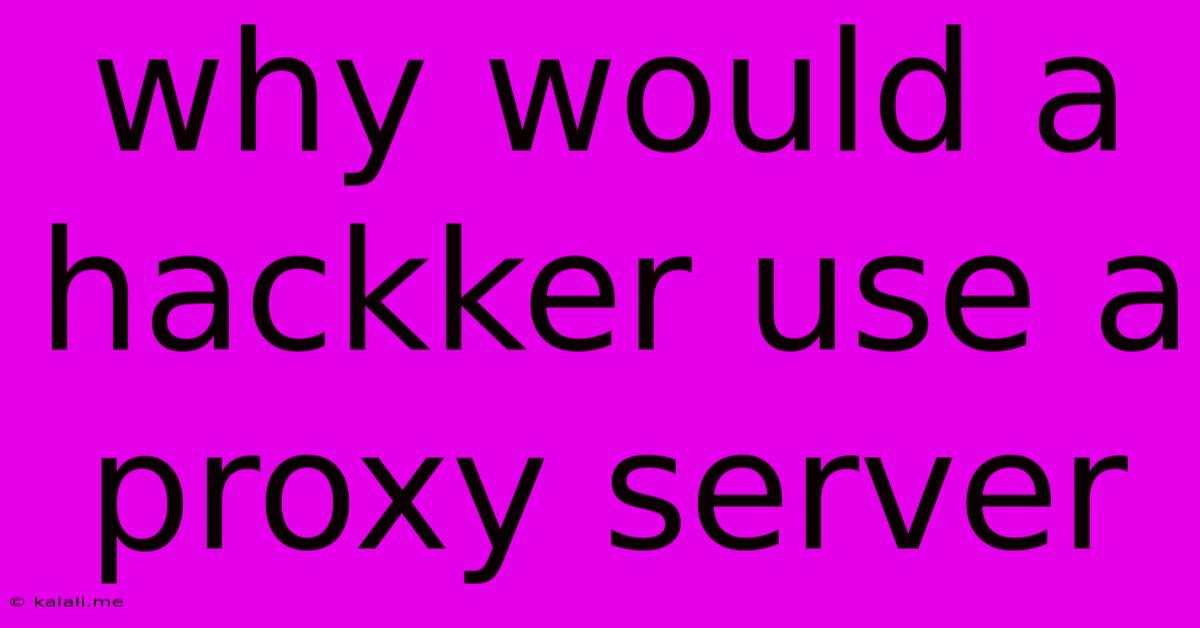Why Would A Hackker Use A Proxy Server
Kalali
Jun 12, 2025 · 3 min read

Table of Contents
Why Hackers Use Proxy Servers: A Deep Dive into Anonymity and Deception
Meta Description: Discover why hackers utilize proxy servers, exploring the techniques they employ to mask their IP addresses, evade detection, and launch malicious attacks undetected. Learn about the various types of proxies and how they aid in cybercrime.
Hackers leverage proxy servers for a multitude of reasons, all boiling down to enhancing their anonymity and obscuring their tracks during malicious activities. Understanding their motivations is crucial in bolstering your own cybersecurity defenses. This article delves into the key reasons why hackers employ proxy servers, explaining the technical mechanisms and the associated risks.
Masking Their True IP Address: The Foundation of Anonymity
The primary reason hackers utilize proxies is to conceal their real IP address. Your IP address acts like your online fingerprint, uniquely identifying your device and location. By routing their traffic through a proxy server, hackers effectively replace their real IP with the IP address of the proxy server. This makes it incredibly difficult to trace their activities back to their actual location and device. This anonymity is crucial for launching attacks without leaving a traceable digital footprint. This is especially important for Distributed Denial-of-Service (DDoS) attacks, where identifying the source is extremely difficult when multiple proxies are used.
Bypassing Geo-Restrictions and Censorship
Many websites and online services implement geo-restrictions, limiting access based on a user's location. Hackers might use proxies located in different countries to bypass these restrictions, accessing resources or launching attacks from seemingly different locations. This circumvention of geographical limitations is a powerful tool, especially when dealing with websites or services that have implemented strong security measures in specific regions. This also enables them to bypass censorship firewalls implemented by governments or organizations.
Evading Detection and Security Measures
Intrusion detection systems (IDS) and other security measures often rely on IP address tracking to identify and block malicious activities. Using a proxy server helps hackers evade these systems, making it harder to detect and prevent their attacks. Furthermore, using multiple proxies can create a complex web of traffic, making it incredibly challenging to pinpoint the origin of the attack. Think of it as a smokescreen, confusing the security systems and buying the hacker valuable time.
Launching Distributed Denial-of-Service (DDoS) Attacks
DDoS attacks overwhelm a target server with traffic, rendering it inaccessible. Hackers often employ botnets, networks of compromised computers, to launch these attacks. Using proxy servers masks the location of these botnet members, making it much more challenging to identify and neutralize the source of the DDoS attack. The sheer scale and distributed nature of these attacks, combined with proxy usage, makes them extremely effective.
Hiding Their Activities from ISPs and Law Enforcement
Internet Service Providers (ISPs) and law enforcement agencies can monitor internet traffic and investigate suspicious activity. By routing their traffic through a proxy server, hackers make it more difficult for these entities to trace their actions and hold them accountable. The proxy acts as an intermediary, masking the true nature of their online activities.
Types of Proxies Used by Hackers
Hackers utilize various types of proxy servers, each offering different levels of anonymity and security:
- Anonymous Proxies: These proxies hide the user's IP address but might reveal the proxy's IP address.
- High Anonymity Proxies: These proxies hide both the user's IP address and the proxy's IP address.
- Transparent Proxies: These proxies don't hide the user's IP address, making them less attractive to hackers.
- Rotating Proxies: These proxies cycle through multiple IP addresses, further enhancing anonymity.
Conclusion: The Ever-Evolving Cat and Mouse Game
The use of proxy servers by hackers highlights the ongoing arms race between those who seek to exploit vulnerabilities and those who strive to protect against them. Understanding the techniques employed by hackers is crucial for implementing robust security measures, and staying informed about the latest threats is paramount in mitigating the risks posed by these sophisticated attacks. While proxies themselves aren't inherently malicious, their misuse underscores the importance of robust cybersecurity practices and advanced threat detection systems.
Latest Posts
Latest Posts
-
Which Of The Following Has The Greatest Momentum
Jun 13, 2025
-
Are Metals On The Right Side Of The Periodic Table
Jun 13, 2025
-
What Is A Literal In Boolean Algebra
Jun 13, 2025
-
Which Of The Following Is Secondary Pollutant
Jun 13, 2025
-
Which Seismic Waves Are Most Destructive
Jun 13, 2025
Related Post
Thank you for visiting our website which covers about Why Would A Hackker Use A Proxy Server . We hope the information provided has been useful to you. Feel free to contact us if you have any questions or need further assistance. See you next time and don't miss to bookmark.